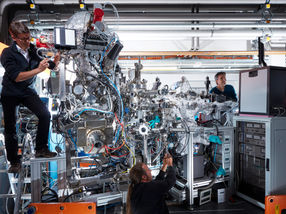How air pollution shapes the methane budget
“The atmosphere is a highly non-linear and complex chemical system”
Advertisement
An international research collaboration, including scientists from the Institute of Climate and Energy Systems – Stratosphere at Forschungszentrum Jülich in Germany, has revealed how air pollutants such as carbon monoxide, ozone, and nitrogen oxides influence the natural breakdown of methane in the atmosphere. The study, published in Nature, highlights how changes in air pollution alter key chemical processes that determine the lifetime of methane – a potent greenhouse gas.
Methane is one of the most powerful greenhouse gases, significantly contributing to global warming. It also affects the formation of other climate-relevant substances like ozone and water vapour – particularly in the stratosphere. However, methane’s atmospheric lifetime depends not only on how much is emitted, but also on how efficiently it is removed.
OH radicals – tiny molecules, powerful impact
At the centre of this removal process is the hydroxyl radical (OH) – a highly reactive molecule responsible for removing around 90 percent of methane in the lower atmosphere. The availability of OH, however, depends on a complex chemical balance. For instance, pollutants like carbon monoxide (CO) and methane itself can suppress OH formation, while ozone (O₃), water vapour (H₂O) and nitrogen oxides (NOₓ) tend to increase OH concentrations.
“The atmosphere is a highly non-linear and complex chemical system,” says Dr Michaela Hegglin from Forschungszentrum Jülich’s Institute of Climate and Energy Systems, who contributed to the study. “Even small changes in its composition can have a large impact on how long methane persists.”
Air quality shifts methane removal – even in the short term
Using a combination of atmospheric observations and modelling data, the research team analysed how changing pollutant levels influenced OH concentrations from 2005 to 2021. Their results show that falling carbon monoxide emissions – for example, due to cleaner combustion technologies – enhanced the breakdown of methane. At the same time, increases in ozone and water vapour also boosted OH levels. Altogether, these shifts strengthened the global methane sink by 1.3 to 2.0 teragrams per year – an increase of 10 to 20 percent.
But the trend isn’t linear. Events such as widespread wildfires or the COVID-19 pandemic caused sharp drops in OH levels. For instance, during the pandemic, NOₓ emissions fell rapidly due to reduced human activity, leading to lower ozone levels and, in turn, a weaker methane sink. As a result, methane accumulated in the atmosphere more quickly.
Linking air pollution control with climate action
The study highlights a crucial link: air pollutants not only harm human health and ecosystems – they also determine how much methane the atmosphere retains. This creates a challenge for policy: while reducing ozone precursors improves air quality, it can unintentionally slow down the removal of methane.
To avoid such unintended consequences, the researchers argue that links between air quality and methane removal must be considered in climate strategies. This is especially relevant in tropical regions, where ozone and water vapour play an outsized role in boosting OH levels.
Climate change itself influences this system in opposing ways: on the one hand, rising temperatures lead to more water vapour, which promotes methane breakdown. On the other, increasing wildfires – a result of climate change – raise carbon monoxide emissions, which in turn suppress OH levels and slow methane removal.



































































